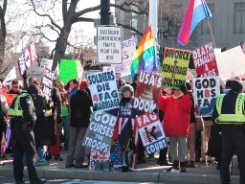BY NATASHA BARSOTTI — The day after US Supreme Court justices appeared reluctant to entertain a pro-gay-marriage ruling as it heard arguments for and against California’s Proposition 8, a majority of them showed willingness to question the constitutionality of the 1996 Defense of Marriage Act (DOMA).
![]()
On the second day of hearings, the nine justices turned their attention to the case of Edie Windsor, 83, who maintains that her 2007 marriage to Thea Spyer “should have offered the same federal rights and benefits as a union between a man and a woman,” The Guardian reports. Windsor argues that section 3 of the act violates the 14th amendment of the US constitution, which guarantees equal protection under the law.
“Today’s oral arguments tells the story and tells the lesson of why it is we have a constitution; to bind us together as citizens of one nation, all of whom are guaranteed the equal protection of the law, and there is no one individual who better personifies the concept of equal protection than my client, Edie Windsor,” her lawyer Robert Kaplan said at a press conference.
“The justices asked all the questions we expected them to ask, and we had good answers, and I am going to adopt my client’s [answer], I think it was good,” Kaplan said when asked about the day’s proceedings. “We are very hopeful that they will strike down DOMA. I’m not in the business of predicting what any of the justices will do, but we are very hopeful that they will affirm the decisions of the courts below.”

The Guardian notes that Windsor charmed the media with her post-proceedings remarks. She is quoted in one tweet as saying she thought the hearing “went beautifully,” that the justices were “gentle,” and she didn’t feel “any sense of inferiority.” She also reportedly told media that she was talking to them “freely,” whereas 10 years ago, she’d have been “hiding in a closet.”
In 2011, the Obama administration said it considered DOMA unconstitutional and would no longer defend it. But according to The Guardian, conservative justices Antonin Scalia and John Roberts criticized the administration for its stance, saying it was “cowardly” and “unprecedented” for it to maintain that it wouldn’t defend the statute in court after calling it unconstitutional while “still enforcing the law and expecting the Supreme Court to toss it out for them.”
But the more liberal Ruth Bader Ginsburg characterized DOMA as telling states there’s “full marriage and skim milk marriage.” Justice Anthony Kennedy also weighed in about the “real risk” of encroaching on state power to define marriage and told DOMA ‘s legal advocate Paul Clement that the statute did not really promote “uniformity” in federal law.
The justices’ statements had reporters hurriedly tweeting that DOMA’s death knell was being sounded as there appeared to be the five votes needed to strike it down.
Here’s a transcript of today’s proceedings.
Outside the court, one spectator tweeted that the atmosphere was like “a giant, pro-same-sex-marriage party; it was electric and beautiful,” even as there were some tense moments with opponents of gay marriage.

Meanwhile, observers suggest the court could avoid ruling on Prop 8’s legality by arguing that the plaintiffs, the opponents of same-sex marriage, do not have legal standing to bring the case.
With such a finding, the lower-court ruling that invalidates Prop 8 would remain in effect, making same-sex marriage legal in California.
Landing image: GLAAD

 Why you can trust Xtra
Why you can trust Xtra


